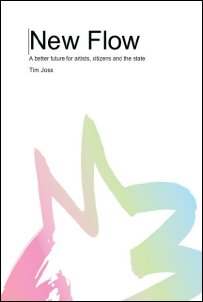‘NEW FLOW – A BETTER FUTURE FOR ARTISTS, CITIZENS AND THE STATE’ by Tim Joss

I was talking recently to a seasoned cultural academic and lamenting the lack of a national cultural policy. He knowingly told me of the time he went to see the Office of Arts and Libraries, which pre-dated the glossy Culture Ministry we have today, where he was quietly told that the official policy was to have no policy. Fifteen years or more later and we still have no national cultural policy. Instead artists and arts organisations find themselves swimming in a sea of initiatives in which creativity sits uncomfortably next to contradiction and confusion. Is this really what increased government interest and investment in the arts has brought about? Tim Joss thinks so, and in ‘New Flow’ he seeks to cut a veritable Gordian knot of confused language, assumptions and practices, and propose a better way of thinking and acting.
Joss has a creditable track record in the arts sector and good connections with the world of science, and is now Director of a charitable foundation supporting a range of initiatives, so he has a wide and informed overview of the issues. In New Flow he has unravelled a confection of complexity and produced an elegant analysis that is readable, innovative and incisive. “What contribution,” he asks, “can artists make to society and how can we make these as open and effective as possible? How do we connect artists and citizens… And how do we get out of today’s complicated mess?” His proposals are novel, apposite and ingenious. [[You cannot timultaneously be at the top table and at arm’s length from it]]
The world we live in now, notes Joss, has changed massively from the one in which many arts organisations and funding institutions were formed. The producer and consumer are merging into the ‘pro-sumer’. The divide between professional expert and citizen is shrinking fast, and in the commercial and social enterprise sector, different ways of delivery and engagement are continually emerging.
The arts sector likes to think that, as a creatively driven and socially aware domain, it is ahead of the pack. Joss disagrees. The arts lag behind technological developments. They rarely engage with social enterprise. Artistic development processes have much in common with science but fail to match science’s approaches to public engagement, research, evidence, innovation and commercial exploitation. “Arts organisations,” he says, “have limited understanding of outcomes, a poor record of building up a body of evidence of the effects of the arts and hence a vulnerability when it comes to accountability.” The arts education models in use are now 25 years old and largely stale. And, he concludes, the arts world is insular. “With insularity goes suspicion. Arts organisations view others as funding competitors or commercial companies with suspect motives.”
Money is not the problem. Society is more complex and exciting than when arts councils were formed. The arts council model can no longer cope with this complexity. The system, he says is “creaking with instrumental inertia”. His explanations for this are intriguing. Excellence and access, the twin pillars of Arts Council missions, involve completely different processes. To try and do both is inherently contradictory. Access and public engagement are treated as if they are the same thing, when in fact they are very different. Finally, the arm’s length principle at the heart of the system no longer makes sense: the arts want to be at the ‘top table’. You cannot, Joss notes, simultaneously be at the top table and at arm’s length from it.
We need, says Joss, to hear more from artists themselves. They need to be more central to the script. Artists aren’t being given sufficient chances to engage fully with society, and if they do not do so they risk having little to say to audiences. The Arts and Film Councils says Joss, have failed to alter significantly the social character of audiences for the arts activities they subsidise, and they blame lack of public engagement on the public’s ‘self-exclusion’ rather than their own policies and practices. It would be remarkable, he dryly comments, if, against the backdrop of momentous change, state arts organisations created long ago were still relevant.
So, we must encourage artistic processes that go beyond narrow historic definitions, and that needs research time: something common in industry, but often marginalised in the arts. To achieve this, Joss argues, requires not a new type of arts council but two arts bodies with different but complementary functions. One would act like a scientific research council and be dedicated to creative R&D. It would sit at arm’s length from government. The other would be a businesslike commissioning and delivery agency which should sit within or alongside government, so as to have a place at the ‘top table’.
Tim Joss is not the first to look critically at the complexities of UK cultural policy and funding. Both Geoff Mulgan and Justin Lewis did so in the 1980s, but while their respective analyses were acute, their solutions were unconvincing. Some of Joss’s themes are not entirely new – Alvin Toffler predicted the pro-sumer 30 years ago. But New Flow provides an excellent synthesis of some key issues and context. Joss writes about the complexities clearly and lucidly. His observations are frequently insightful and the text is laced with pertinent facts and examples. He is forensic in his analysis but never cruel in his criticisms. Tim Joss wants the best for the arts, and, if enough people read this profound and stimulating analysis, the arts may just get the changes they deserve.

Join the Discussion
You must be logged in to post a comment.